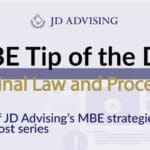How to Improve Your MPRE Score
 If you are looking to improve your MPRE score, you may be wondering what you can do differently.
If you are looking to improve your MPRE score, you may be wondering what you can do differently.
The first step is usually to ask why your MPRE score is low. In other words, why do you miss MPRE questions?
Your MPRE score could be low because you do not know the rules. Or because you read the fact patterns too quickly. Or because you get tricked by the answer choices. Or a number of other reasons. One way to determine why your MPRE score is low — and to improve your MPRE score at the same time — is to learn to approach MPRE questions slowly and methodically.
How to Improve Your MPRE Score:
If you want to learn to answer questions slowly and methodically when you practice for the MPRE (Multistate Professional Responsibility Exam), go through the below method. This should not only help you step back and slow down, it should also reveal why you answer questions incorrectly to begin with. And it should
The first step is to read the fact pattern slowly. Many students have the bad habit of reading through the facts quickly and have no clue what they just read. So, read the facts slowly and even actively, meaning underline or circle anything that stands out to you, if this helps you read slowly.
Next, read the call of the question. Pay close attention to what it is asking, as your answer choice should answer it. That may sound silly, but not every answer choice is responsive to the call of the question. Some questions will say, “Is the lawyer be subject to discipline?” Which is a very different question than, “Is the lawyer subject to civil liability?” In the former instance, you have to ask if the lawyer violated a Rule of Professional Conduct. In the latter instance, you have to ask if the lawyer breached a duty which caused the client harm.
(Note: If you find yourself speeding through the fact pattern when you read a question, the simple step to improving your MPRE score may simply be to slow down when you read an MPRE fact pattern and question!)
Once you read the call of the question you should stop and give yourself a second to think. Often on exams, students go straight to the answer choices without giving their brain a second to process the facts, the question and what the answer is. When you give yourself a second to think, you should ask yourself: what Model Rule is at issue? In other words, what is the issue? Then, state the applicable rule in your head. Once you do this—actually give your brain a moment to process the issue and the applicable rule, you can analyze the facts to reach an answer. Only once you have done that, should you move on to look at the answer choices to find the one that matches the answer you came up with in your head. After you identify the correct choice, you should explain why the other responses are incorrect. This is not only excellent practice and allows you to get the most out of each question, but it also acts as a safety-net to ensure that you picked the correct answer. In other words, for each question, go through IRAC:
- What is the legal issue?
- What is the legal rule?
- How would I apply it in this case?
- What conclusion matches my conclusion?
- Why are the other answer choices incorrect?
You will find if you do this that you not only slow down, but you will also learn the rules better, learn how to apply them better, and see your score improve through practicing.
(Note: If you find yourself unable to state the rule, this means you have to learn the law better!!)
Also, note that on the actual MPRE, you do not have to go quite this slowly through a question. This is a method to improve your MPRE score through practice.
Let’s give it a try. Here is a practice question:
An attorney agrees to represent a plaintiff in a negligence case on a contingency fee basis. After the client retained the attorney, the attorney realized that he needed the assistance of someone who was more familiar with the complex medical issues that were at issue in the case. The attorney thus consulted an attorney who had specialized in medical malpractice. The two attorneys agreed that the other attorney would assist with the case to the extent needed and that the attorneys would divide the fee proportionately to the services performed by each attorney. The plaintiff was not told about the arrangement. Once the case was concluded, the attorney provided the plaintiff with a statement that explained the fee division. The total fee was reasonable.
Was the arrangement between the two attorneys proper?
(A) Yes, because the fee paid by the plaintiff was reasonable
(B) Yes, because the attorneys divided the fee in proportion to the amount that they each worked on the case.
(C) No, because the plaintiff was not advised that the other attorney was working on the case.
(D) No, because attorneys from different firms are not permitted to share fees.
Step 1: Read the facts s-l-o-w-l-y. Students do not save themselves any time by “reading” the facts super quickly once and then having to re-read them slowly because they can’t remember what they just read. So, read the facts slowly with the aim of understanding what is being explained.
Step 2: Read the call of the question. The call of the question here is, “Was the arrangement between the two attorneys proper?” What does this mean? Well, according to the National Conference of Bar Examiners, the folks whom write the MPRE, “proper” means: “[w]hether the conduct referred to or described in the question is professionally appropriate in that it a) would not subject the lawyer or judge to discipline; and b) is not inconsistent with the preamble, comments, or text of the ABA Model Rules of Professional Conduct or the ABA Model Code of Judicial Conduct; and c) is not inconsistent with generally accepted principals of the law of lawyering.”
So, as it relates to this question, the call is asking if the arrangement would subject the attorneys to discipline, is consistent with the Model Rules of Professional Conduct, and whether the arrangement is consistent with the generally accepted principals of the law of lawyering.
Step 3: Be sure you have not looked to the answer choices yet! Get in the habit of covering them up with your hand or extra piece of paper if you have to. Ask yourself, “What Rule is at issue here?” Well, the “arrangement” referred to relates to the originally retained lawyer getting the help from an additional lawyer to competently handle the case and splitting the fee proportionally. If you boil this down, the question is: Are lawyers allowed to get help from other lawyers outside of their firm and share a fee? According to the Rules, yes they are, however, the retained attorney must get informed consent from its client first. (Sometimes you just might not know the rule! This means that you should learn your outline better before tackling questions!)
Step 4: Next, analyze the facts in light of the applicable Rule. The facts tell us that the retained attorney worked with another attorney more familiar with the complex medical issues at hand, and planned to split the fee proportionally. The facts also indicate that the client was made aware of all of this once the case was concluded when it received a statement regarding the fee division. Thus, none of the facts indicate that the client gave informed consent for the new attorney to help out on the case. Rather, the client was told about the arrangement after the fact. This means the arrangement was not “proper” (hence, answering the call of the question) because the client was not asked first.
Step 5: Now that you have an answer to the question in your head, look for that answer in the answer choices. (C) appears to be a very close fit.
Step 6: Lastly, read the other answer choices and explain to yourself why they are incorrect. (A) is incorrect because while the fee was reasonable, the client did not give informed consent to the arrangement. (B) is incorrect for the same reason as (A). (D) is wrong because this is an incorrect statement of the Rules. Attorneys from different firms are allowed to share fees, so long as they follow the proper procedures. See Model Rule 1.5(e).
If you go through this method a few times, rather than just racing through MPRE questions and wondering why your score never improves, you will learn to answer questions more methodically and strategically. You will also be less “tricked” by answer choices because you will confidently apply the rule to the facts before reading every answer choice.
Further, you will find that any big mistakes that you are making — i.e. reading the fact pattern too quickly, or not knowing the law well enough — will be revealed right away!
Lastly, by approaching questions strategically and methodically, you are also double-preparing yourself to approach bar exam MBE questions!
If you are looking for tutoring for the MPRE, we offer MPRE tutoring. Our MPRE tutors will work with you one-on-one with not only mutliple-choice strategies but also substantive law. We have a stellar MPRE outline that we give students as well as very good practice questions. We offer tutoring online and in person. We have helped many first, second, third, fourth, fifth+ time takers pass the MPRE.
We have a 100% passage rate for our students who have met us for “full” MPRE tutoring (five sessions or more).
Further MPRE Resources:
If you are looking for free resources, you are in luck! For more MPRE tips and tricks, we highly recommend that you review all of our MPRE posts by clicking here. Some popular ones are:
- How to Study for the MPRE: In this post, we give you a quick rundown of how to study properly for the MPRE.
- How many questions you should be answering correctly when you practice? (It may surprise you to know that it is almost the same number of questions that you need to be answering correctly to pass no matter what a “passing score” is in your jurisdiction!)
- MPRE Free questions! Here is a list of free sources for MPRE questions. Even if you are taking an MPRE course, it does not hurt to try a variety of questions. This includes released MPRE questions!
- MPRE Tip: Become familiar with Key Words and Phrases on the MPRE: This post gives you an overview of how you can avoid making mistakes by paying careful attention to the call of the question. If you are taking the MPRE this weekend, it is a good last-minute read to make sure you don’t fall into a trap!
- Five Last-Minute tips to Pass the MPRE: These are some last-minute tips and tricks that help students pass the MPRE. They are good things to keep in mind on the exam day!
- How to Pass the MPRE the First Time you Take It: If you are in law school wondering how to conquer this thing the first time you take it, read our advice here.
Good luck studying for the MPRE!
Looking to Ace the MPRE?
- Enroll in our 5-star rated free MPRE Course, complete with expert guidance, an exclusive outline, practice questions, and a one-sheet.
- Tackle the Real MPRE questions — the gold standard for test preparation.
- Elevate your preparation with personalized MPRE private tutoring, featuring a tailored study plan and dedicated MPRE outline.
- Dive into our assortment of complimentary top-notch MPRE resources for your success.






Comments are closed.